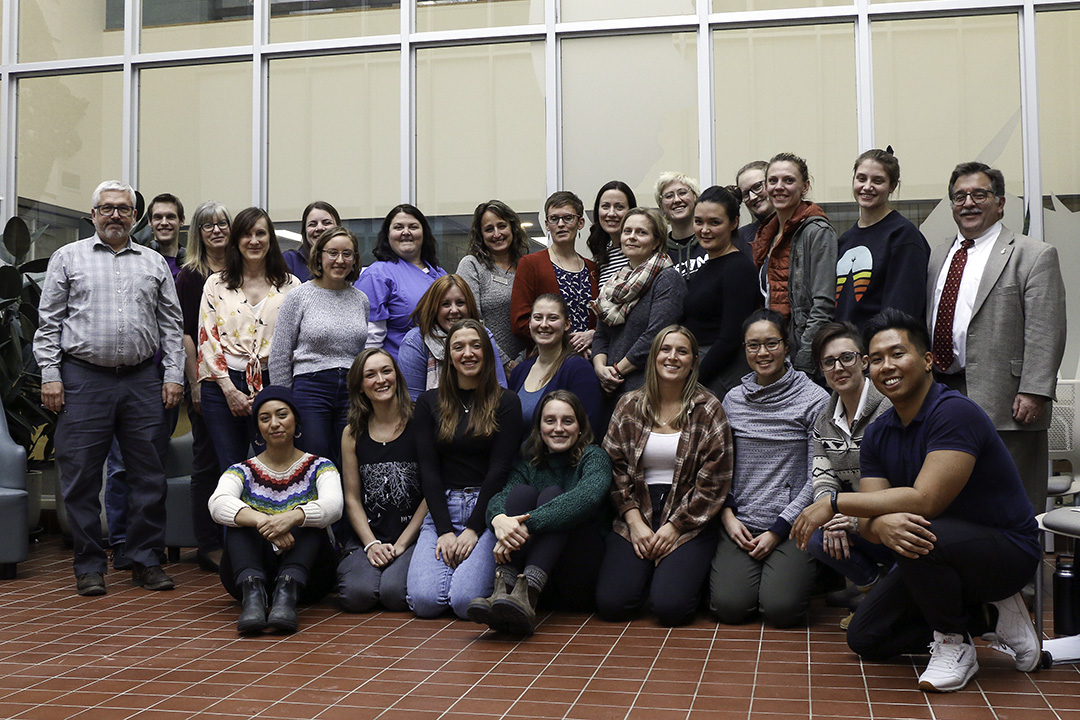
Blanket exercise builds understanding at the WCVM
Two hours can make a big difference in one’s understanding of the role all Canadians play in building reconciliation with Indigenous people in Canada.
By Jeanette NeufeldAs part of an effort toward creating awareness of the history of Indigenous people in Canada, 28 staff, students and faculty at the Western College of Veterinary Medicine (WCVM) recently took part in a blanket exercise — a unique “participatory history lesson” created by KAIROS Canada and facilitated by staff from the Canadian Roots Exchange.
The group exercise is an opportunity to learn more about the cumulative impacts of colonization on Indigenous people.
Participants see the effects of treaties, disease, residential schools and the erosion of communities, as those standing around them are separated or removed from the group and the blankets representing the physical landscape of Canada are taken away.
It’s a thought-provoking and emotional experience. Participants often come away from it with a new appreciation for the struggles that Indigenous people have faced since settlers first arrived in Canada.
“I was really interested to see if it would give me a different perspective, which I found it really did,” says Sarah Thomas, a second-year veterinary student at the WCVM.
Thomas says it’s worth investing time into participating in exercises like this one.
“It’s only two hours. It really changes your perspective. There’s nobody that can say they don’t have time.”
The event was organized by the One-Welfare Veterinary Outreach (OVO) Initiative, a new student club at the WCVM. Its aim is to create opportunities for students to engage with the communities that they will serve as veterinary professionals.
For Chloe Roberts, the club’s president, the blanket exercise introduced her to a new level of awareness about Indigenous history.
“Through this club, I’ve been learning a lot this semester about those issues and the topics talked about. But to place it in such a personal setting was really powerful, and it really sparked empathy,” says Roberts, a third-year veterinary student at the WCVM.
“It’s important. It’s part of Canadian history, and it’s something not many people are educated about, and I think they should be.”
The club’s 80 members work to develop their understanding of One Welfare — exploring the connection between human, animal and environmental health — through self-study, group discussions, educational opportunities and volunteering.
“So far, we’ve really been trying to promote community engagement and increase education and awareness of certain social issues that we think veterinarians will come into contact with and should be knowledgeable about as professionals … who are going to be looked to in the communities as leaders,” says Roberts.
Jessica Alegria, who helped organize the blanket exercise for the WCVM students and staff, says she’s excited about veterinary professionals engaging with issues of social justice.
“I was happy to hear about how people are thinking about the communities they’re serving,” says Alegria, who led the exercise alongside colleague Bayani Trinidad.
The WCVM’s Indigenous Engagement and Reconciliation Fund helped to support the OVO Initiative’s work in organizing the blanket exercise, and Roberts says the club’s members hope to offer more educational opportunities in the future.
They plan to expand their efforts toward understanding the impact of oppression, poverty and injustice on many different communities, and learning how veterinarians can learn to become effective allies while taking care of the health of both animals and their human owners.
“Creating this club was about creating a safe space where people can ask the tough questions and feel uncomfortable — and feel okay being that way,” says Roberts.
